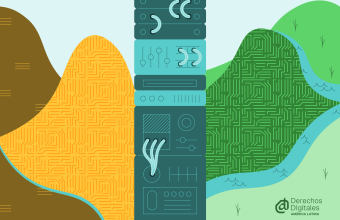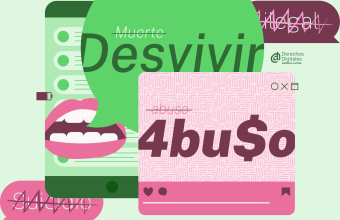We are extremely concerned about the additional provision included in Supreme Decree 4231, which expands the scope of Supreme Decree 4200, that provided in generic terms the criminalization of disinformation, to make explicit the possibility of criminal charges against any person who disseminates content that “endangers or affects public health”. The measure ignores the criticisms of the Inter-American Commission on Human Rights (IACHR) and international organizations such as Human Rights Watch and Amnesty International for its ambiguity and possible effects on freedom of expression, and does not respond to the concerns related to the imprecision of the terms adopted.
According to the text, “persons who incite non-compliance with this Supreme Decree or disseminate information of any kind, whether in written, printed, or artistic form and/or by any other procedure that puts at risk or affects public health, generating uncertainty in the population, shall be liable to prosecution for the commission of crimes under the Criminal Code. As in the text of the previous decree, the terms used to typify the conduct are generic. Moreover, there is no precision about what the crimes involved would be, since “disinformation” is not contemplated in the Penal Code and, therefore, is not a crime.
Although Supreme Decree 4200 provides for penalties of one to ten years for people who commit offences against public health, the corresponding article 216 of the Criminal Code does not include offences of opinion of any kind.
The measure introduced by the Decree is in violation of the fundamental rights of freedom of expression and information, which are provided for in Article 13 of the Inter-American Convention on Human Rights and in the Political Constitution of the State and contravenes the recommendations of international human rights experts of the United Nations formulated for the current context of pandemics, which recognize the seriousness of the current health crisis and the possibility of using emergency powers, reminded States that “any emergency response to the coronavirus must be proportionate, necessary and non-discriminatory”, adding that emergency declarations should not be used as a means of concealing repressive action under the pretext of protecting public health, or should they be used to silence the work of human rights defenders” nor should they be used “to stifle dissent”.
Specifically on freedom of expression, the United Nations and Inter-American System rapporteurs have previously stated that “general prohibitions on the dissemination of information based on vague and ambiguous concepts are incompatible with international standards on restrictions on freedom of expression and should be repealed”. They further recall that “States may only establish restrictions on the right of freedom of expression in accordance with the test provided for in international law for such restrictions, which also requires that they be provided by law, to achieve one of the legitimate interests recognized by international law and result necessary and proportionate to protect that interest”.
For its part, the recent Resolution 1/20 Pandemic and Human Rights in the Americas of the Inter-American Commission on Human Rights has referred to the matter recommending that States “ensure that any restrictions or limitations imposed on human rights for the purpose of protecting health in the context of the COVID-19 pandemic comply with the requirements established by international human rights law. In particular, such restrictions must comply with the principle of legality, be necessary in a democratic society, and thus be strictly proportionate to meet the legitimate aim of protecting health.
Its wording leaves ample room for interpretative abuses and there are fears of a political intent to silence dissent behind both decrees. Since the publication of Supreme Decree 4200 last March 21, 67 people have been arrested on the grounds that they were misinforming and in complete lack of transparency about their identities, the charges, and when and how they were apprehended. Several of these persons are suspected of being activists, and the Government itself claims that they are “political agents”. It is noteworthy that among those arrested, 37 have allegedly had a shortened trial and are reportedly in prison serving their sentences.
In addition to the above, there are public statements by the Minister of Government, Mr. Arturo Murillo, to the effect that the police are carrying out ‘cyber-patrols‘ in order to identify people who are alleged to be spreading disinformation. This action, to the extent that its scope and legal basis have not been clarified, can be interpreted as a measure of vigilance and monitoring by civil society, which is unconstitutional and illegal, in addition to contravening the human rights commitments signed by the Bolivian State. Democracy cannot be exercised when basic rights are limited and coerced.
It is unacceptable that the health emergency affecting various countries of the region should serve as an excuse for the weakening of fundamental rights. As international human rights experts state, the COVID-19 epidemic must not be used as a basis for monitoring minorities, specific groups or individuals, or function as a disguise for repressive action or the silencing of human rights defenders. “Restrictions adopted in response to the virus should be motivated by a legitimate public health objective and not simply used to eliminate dissent”.
Fundación InternetBolivia.org, following its mandate of defending and promoting digital rights, Derechos Digitales and the national and international organizations that have signed this declaration, demand that the government of the transitional president Jeanine Añez immediately abrogate the aforementioned decrees and clarify the 67 cases of arrest in application of these decrees.
Signatures
Organizations:
- Electronic Frontier Foundation (EFF)
- Mexiro AC, México
- Access Now
- R3D: Red de Defensa de los Derechos Digitales, México
- TEDIC, Paraguay
- Fundación Datos Protegidos, Chile
- Asociación por los Derechos Civiles (ADC), Argentina
- OBSERVACOM, Latinoamérica
- Hiperderecho, Perú
- Fundación Construir, Bolivia
- RadiosLibres.net, Ecuador
- Radialistas Apasionadas y Apasionados, Ecuador
- Asuntos del Sur, Argentina
- IPSOAR, Argentina
- Espacio público, Venezuela
- Ciervos Pampas Rugby Club
- Sursiendo, Comunicación y Cultura Digital, México
- MigrantesxMigrantes, Argentina
- Usuarios Digitales, Ecuador
- World Association for Christian Communication
- Agencia de Prensa Internacional Pressenza
- Fundación Hábitat Verde
- Cooperativa Tierra Común, México
- Intervozes – Coletivo Brasil de Comunicação Social, Brasil
- Feminismo Comunitario Antipatriarcal Bolivia
- MundoSur, Argentina
- Fundación Nemboati, Bolivia
- Diario Digital: “El Popular”, Bolivia
- Autonomía Frente Universitario
- Federación Estudiantil Boliviana Anarquista (FEBA)
- Fundación Integral para el Desarrollo Regional (FINDER) El Salvador
- Oficina Jurídica de la Mujer, Bolivia
- Lab TecnoSocial, Bolivia
- Manodiversa, Bolivia
- Café Wayruru, Bolivia
- Agrupación Ciudadana CREANDO OPORTUNIDADES – CREO
- Coordinadora de la Mujer, Bolivia
- ONG Realidades, Bolivia
- ASUNCAMI, Bolivia
- Crea País, Venezuela.
- Feeling, Colombia
- Revista Muy Waso, Bolivia
- Fondo de Mujeres Bolivia Apthapi Jopueti
Individuals
- Esteban Calisaya, Bolivia
- Cristian León, Bolivia
- Edgar Navarro, México
- Fernanda Galicia, México
- Eduardo Carrillo, Paraguay
- Tatiana Cárdenas, Colombia
- Sofía Castro Mariel, Argentina
- María José Barlassina, Argentina
- Agustina Salas, Argentina
- Ignacio Fernando Lara, Argentina
- Nayra Abal, Bolivia
- Georgia Rothe, Venezuela
- María Belén Arroyo, Argentina
- Antonella Perini, Argentina
- Catalina Rodas, Colombia
- Fiorella Wernicke, Argentina
- Natalia Rodriguez Blanco, Bolivia
- Alvar Maciel, Argentina
- Caio Fabio Varela, Argentina
- Guillermo Movia, Argentina
- María Lois, España
- Domenico Fiormonte, Italia
- Lourdes Bermúdez Bring, Cuba
- Orietta E. Hernandez Bermúdez, Cuba
- Danhiela Hernandez Bermúdez, Cuba
- Gustavo Siles, Bolivia-España
- Adriana Bolívar, Venezuela-Argentina
- Camilo Vallejo Giraldo, Colombia
- Enrique Pomar Meneses, Bolivia
- Natalia Antezana Bosques, Bolivia.
- Roberto Savio, Presidente de Othernews, Roma Italia
- Ximena Argote Tarachi – Bolivia
- Esteban Tavera, Colombia.
- Daniel Botero, Colombia
- Gabriela Ugarte Borja, Bolivia
- Rubén Elvis Mendoza Aiza, Bolivia
- Andrés Agudo, Bolivia
- Inés Gonzáles Salas, Bolivia
- Jorge Vladimir García, Bolivia
- Eugenia D’Angelo, Argentina
- Susana Saavedra, Bolivia
- Nataly Alvarado, Bolivia
- José Luis Claros López, Bolivia
- Luis Fernando Villegas Pacasi, Bolivia
- Adriana Pinaya Johannessen
- Alex Jimmy Verduguez, politólogo, Bolivia
- Gabriela Melgar, Comunicadora, Guatemala
- Moisés Ernesto Uceda, El Salvador
- Manuel Antonio Menacho Céspedes, Bolivia
- Francisco Canedo S.de L., Bolivia
- Jinky Irusta Ulloa, Bolivia
- Patricia Telleria Saavedra- Bolivia
- Vir Martí Patzi Mamani – Bolivia
- Dan Maitland, Canadá
- Alex Ojeda, Bolivia
- Mayra Barzaga García, Cuba
- Patricia Vargas Pacheco, Bolivia
- Dennis Vallejos Usnayo, Bolivia
- Huascar Berrios Copa, Bolivia
- María Vasquez Licona, Bolivia
- Ignacio Morales, Bolivia
- Ricardo Quiroz Gutiérrez, Bolivia
- Solangeles Ortiz Bedregal, Bolivia
- Marco Antonio Saavedra Mogro Ph.D, Bolivia
- Marieliza Vasquez, Bolivia
- Juan Manuel Crespo, Bolivia
- Jenny Lourdes Montero, Bolivia
- Lucas De La Cruz, Perú
- Liseth P. Jaen Hurtado, Bolivia
- Bethel Núñez Reguerin, Bolivia
- Alessandra Saavedra Tamayo, Bolivia
- María del Pilar Apaza Pinto, Bolivia
- Lila Andrea Monasterios, Bolivia
- Gabriela Blas Chumacero, Bolivia
- Cecilia Saavedra Tamayo, Bolivia
- Emma Bolshia Bravo Cladera, Bolivia
- Jorge Molina Carpio, Bolivia
- Pablo Collada, México
- Adriana Pérez Piegard, Venezuela
- Olga Paredes Alcoreza, Bolivia
- Ilze Monasterio Zabala, Bolivia
- Javier Arteaga, Colombia
- Daniel Willy Montoya Ugarte, Bolivia
- Pablo Andrés Rivero, Bolivia
- Jorge Molina Carpio, docente-investigador UMSA, Bolivia
- Francisco Ergueta Acebey, docente-investigador UMSA, Bolivia
- Enrique Castañón Ballivián, Bolivia
- Paola Yañez Inofuentes, Bolivia
- Zulema Alanes, Bolivia
- Pamela Gómez, Bolivia
- Sylvana B. Exeni, Bolivia
- Hardy Beltran Monasterios, Bolivia
- Grecia Cecilia Tardío Rodríguez, Bolivia
- Ruben Hilare Quispe, Nación aymara
- Dardo Ceballos, Uruguay
- Angus McNelly, Reino Unido
- Kathryn Ledebur, Andean Information Network, Bolivia
- Nicole Fabricant, Estados Unidos
- Daniel Willis, Reino Unido
 Infraestructuras tecnológicas y medioambiente
Infraestructuras tecnológicas y medioambiente Lenguaje vigilado
Lenguaje vigilado 20 años de Derechos Digitales
20 años de Derechos Digitales